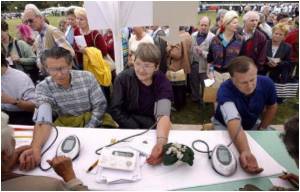Uncontrolled blood pressure takes away the lives of about 7.1 million worldwide every year. A systolic blood pressure above 140 millimetres of mercury and a diastolic pressure above 90 mmHg brand a patient as hypertensive and there are an estimated 1 billion people who have this degree of hypertension in the world. Hypertension is managed primarily by the use of ‘anti hypertensive drugs’. These drugs work by helping blood vessels to relax. Severe hypertension may require three or more blood pressure tablets. Drug therapy is definitely superior over lifestyle modifications in aiding to attain optimum blood pressure.
Unfortunately 15 per cent of hypertensive patients do not respond to anti-hypertensive drugs. A new technique of zapping a nerve with radio waves has been found to be effective in controlling hypertension in patients resistant to anti hypertensive drugs. Nerves surrounding the kidney are targeted in this procedure. These nerves are housed within the wall of renal artery and increase blood pressure by promoting salt and water retention, and constricting blood vessels. Activation of renal sympathetic nerves is key to pathogenesis of essential hypertension.A probe is inserted through the patient’s upper thigh and radio waves are delivered to the inside of the renal artery. This heats up the artery by 10°C and the process literally switches off the nerves (activity of the nerve is reduced by between 30 and 80 per cent. The artery is unarmed in the process. The treatment brings down hypertension and would cut the risk of stroke and heart disease. Researches haven’t found out any serious side-effects associated with this modality of treatment.
The trial involved 106 patients with systolic blood pressure of more 160 mmHg and taking three or more anti-hypertensive drugs. Around half experienced the procedure. The systolic blood pressure fell by at least 10 mmHg in 84 per cent of those who received the treatment (after 6 months). The results were published the leading medical journal Lancet.
Murray Esler of the Baker IDI Institute in Melbourne, Australia, a leading member of the research team assures that renal sympathetic denervation will have a long lasting effect. This however requires further discussion. The new modality of treatment should be available in Europe and Australia within a year. However bigger trials and deeper dive in to long term efficacy need to be performed.
Scientists believe the discovery could lead to a new approach to managing high blood pressure.
Source-Medindia














